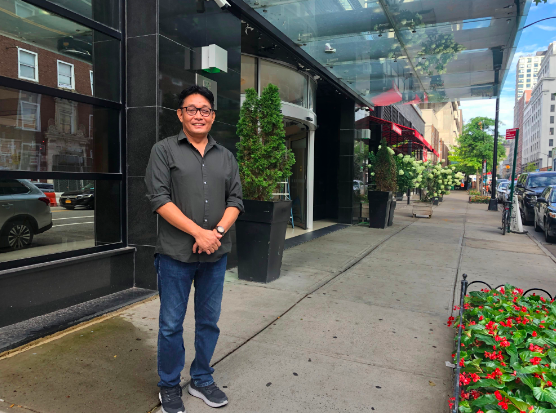Phurbu Tshering: Finding a New Job Amid a Crisis
By Henry Street Settlement

When Covid-19 struck, and unemployment numbers skyrocketed, Henry Street’s employment coordinators quickly pivoted to place clients into new jobs. Since then, they have helped 77 workers find new employment, despite the crushing economy. Among them is Phurbu Tshering.
Tshering arrived in the United States in January 2019. A Tibetan from New Delhi, he was very glad to finally join his wife and two now-adult children after a decade apart. It was a “little step,” he says, getting to know his new country and its people, because his wife was a pro at both English and geography, introducing him to the subway and taking him all over the city.
A friend connected Tshering to Henry Street, where he enrolled in ESOL and began talking with his teacher, Ned Gardner, about his job search.
Tshering, who had worked in the hotel industry in India, was optimistic about finding a familiar job, but it took months for his work permit to arrive. In the meantime, he worked several informal jobs, but wages were low—well below minimum wage. When he was offered a friend’s stall selling photo frames in Times Square, he took it.
Then the pandemic struck, and his market closed. Tourists disappeared practically overnight, and Tshering joined tens of thousands of newly jobless New Yorkers. Yet he is also one of dozens of unemployed workers whom Henry Street’s Workforce Development Center has managed to connect with jobs.
The center’s employment coordinators got busy in March, building new relationships and reinvigorating old ones with industries that are hiring, from cleaning companies to delivery services, a bank, and a health care system.
“I was worried because there was no income,” Tshering says of Covid-19’s impact. His wife’s babysitting job came to an end when the family she cared for left for a house upstate. On top of that, the couple both contracted the virus, leaving Tshering panicked. “There was nobody here to look after us,” he says. Both have recovered, though they were hospitalized briefly.
Tshering considered construction work, taking a 10-hour online certification course. But like many English learners, he found the training difficult to understand. “Then I went to Henry Street again,” he says. “I sent an email to Mr. Ned, ‘Can you please help me, I’m in very bad condition.’” This time he met employment coordinator Jayne Sugg, who gave him a heavy dose of encouragement, imploring him not to give up. “We’ll find something” she said. “I was very happy; she was so kind,” Tshering says.
Jane sent Tshering on three interviews—including one for a job making tomato sauce and another at a major drug store. The third, at We Clean, was the charm. In early July 2020, with his work permit finally in hand, Tshering was assigned by the maintenance company to the Downtown Brooklyn Holiday Inn—where he arrives weekday mornings at 9 a.m. from his home in Bushwick. “It’s very good,” he says, “and suitable work for me because I did this kind of work in India for a long time.” Asked whether the work is hard, he simply compares it to his former 12-hour work days in India: “Here we have to work only eight hours; so I don’t think it’s very hard.”
If you need help with your job hunt, contact Henry Street’s Workforce Development Center at 212-478-5400.
